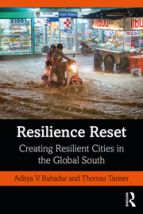Resilience Reset: Creating Resilient Cities in the Global South

Aditya V Bahadur and Thomas Tanner consider many current practices for managing climate risks to be insufficiently ambitious and even irrelevant, in light of the urgency and variability of these risks. In this book they call instead for a “resilience reset”, or a reframing of conventional thinking and action related to resilience building, toward innovative modes. These modes are grouped into several categories:
- enhancing data collection and analysis
- supporting community resilience
- embracing informality
- shifting from a focus on hard infrastructure to soft infrastructure/capacity building
- improving financing mechanisms
- responding to urban climate risk in a world transformed by COVID-19
Each chapter describes the current state of play in a category, the challenges associated with the status quo, and an alternative vision. These descriptions are undergirded by attention to the wider political economy that contributes to climate-related vulnerability, and the inequalities and injustices in the distribution of this vulnerability.
An example of enhanced data collection is Iska, a system for forecasting tropical weather that is much more accurate and precise than conventional forecasts. As the authors explain, “It does this by running remote sensing data from multiple satellites and ground-based stations through a multicore supercomputer” and “also includes a self-learning AI system that predicts the trajectories of individual thunderstorms by merging the numerical forecast system with observational data from lightning detection, satellite imagery and weather radars” (page 36). Advanced technology can be integrated with (rather than viewed as a replacement for) human-centred approaches. For instance, the Dar Ramani Huria project combines drone mapping and participatory methods to create a detailed map of flood risk in Dar es Salaam, notably its informal settlements.
Innovation is of course not only technological, and Resilience Reset also explores financial, social and political innovation to improve climate resilience. For instance, the Women’s Union in Da Nang, a typhoon-prone Vietnamese city, administers revolving loans to low-income residents that enable them to reinforce their homes. A recurrent theme when discussing these non-technical approaches is the importance of partnership – for instance among affected residents, volunteers, researchers, local authorities and donors – to meet daunting climate challenges.
Resilience Reset provides many examples of urban climate innovations, from climate-proofing urban agriculture to improving infrastructure and challenging obstructive governance (although many of these remain small-scale, short-term or experimental). But the book is more than a catalogue of positive past projects. It offers a framework for understanding the limitations these innovations help to overcome.
Further reading:
Bahadur, A and T Tanner (2014), “Transformational resilience thinking: putting people, power and politics at the heart of urban climate resilience”, Environment and Urbanization Vol 26, No 1, pages 200–214, available at https://journals.sagepub.com/doi/full/10.1177/0956247814522154.
Cabannes, Y (2021), “Contributions of participatory budgeting to climate change adaptation and mitigation: current local practices across the world and lessons from the field”, Environment and Urbanization Vol 33, No 2, available at https://journals.sagepub.com/doi/full/10.1177/09562478211021710.
Ziervogel, G, M Pelling, A Cartwright, E Chu, T Deshpande, L Harris, K Hyams, J Kaunda, B Klaus, K Michael, L Pasquini, R Pharoah, L Rodina, D Scott and P Zweig (2017), “Inserting rights and justice into urban resilience: a focus on everyday risk”, Environment and Urbanization Vol 29, No 1, pages 123–138, available at https://journals.sagepub.com/doi/full/10.1177/0956247816686905.
Search the Book notes database
Our Book notes database contains details and summaries of all the publications included in Book notes since 1993 - with details on how to obtain/download.
Use the search form above, or visit the Book notes landing page for more options and latest content.
For a searchable database for papers in Environment and Urbanization, go to http://eau.sagepub.com/

